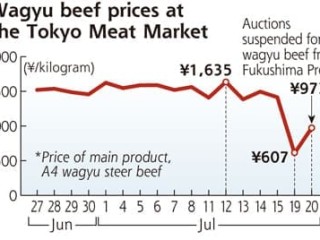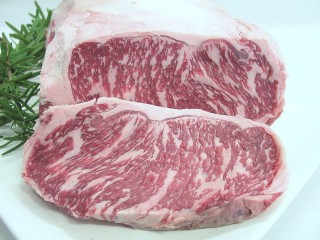 Growing concern about cesium contamination of straw fed to beef cattle is driving down wholesale and retail beef sales in Japan, according to the Yomiuri Shimbun newspaper today.
Growing concern about cesium contamination of straw fed to beef cattle is driving down wholesale and retail beef sales in Japan, according to the Yomiuri Shimbun newspaper today.
Sales are declining despite assurances by the Health, Welfare and Labour Ministry that there is no immediate threat to health from eating domestic meat contaminated with radioactive cesium over the government's limit of 500 becquerels per kilogram.
The numbers of cattle farms that unknowingly used rice straw containing high levels of
radiation as stock feed has spread to nine prefectures, including some outside the northeast Japan region where the Tsunami hit.
Beef from the majority of 1485 cattle that had so far been identified as being exposed to contaminated feed has already been distributed nationwide, causing serious negative reactions among the trade and consumers.
At major supermarket chain Inageya Co, sales of domestic beef declined by 20pc from the same period of last year after the Agriculture, Forestry and Fisheries Ministry announced on Friday it would conduct an emergency survey of cesium contamination in rice straw feed.
Sales of beef also fell below those of the same period last year at supermarket chain Life Corp.
In contrast, sales of imported beef, pork and chicken meat are growing, the Yomiuri Shimbun said.
In an effort to ease concerns among consumers, some supermarkets are providing detailed information on the origin of beef or have stopped selling beef produced in areas where radioactive cesium has been detected.
Last Sunday, supermarket chain Ito-Yokado started labelling domestic beef with prefectures of origin.
Reins International, operator of the Gyukaku barbecue restaurant chain and others, stopped handling beef produced in Fukushima prefecture, where most of the radioactive beef has come from. It said it had also stopped handling beef produced in 12 other prefectures in the eastern part of the nation.
The barbecue restaurant chain Anrakutei said in a statement: "We inspect beef for radiation when we receive it. Since the Great East Japan Earthquake, we haven't accepted beef produced in Fukushima Prefecture."
 Concern has been growing in the restaurant industry. "Customer traffic is down, and we're worried the problem will worsen," a source from a large-scale restaurant operator told the Yomiuri Shimbun.
Concern has been growing in the restaurant industry. "Customer traffic is down, and we're worried the problem will worsen," a source from a large-scale restaurant operator told the Yomiuri Shimbun.
Wholesale meat markets are also experiencing problems. At Tokyo’s Central meat market, the average wholesale price of A4 Wagyu beef, the second-highest class of Wagyu, traded on Wednesday was ¥973/kg carcase weight, down by more than 30pc from ¥1414/kg at the end of last week. Beef from Fukushima, shipments of which were banned on Wednesday, was not traded on the day.
Though Wednesday's price was up from Tuesday's ¥607/kg, wholesalers are still concerned. Tuesday's trading included beef from Fukushima Prefecture.
At an explanatory meeting organised by the farm ministry on Wednesday for beef producer and wholesaler organisations, one participant said, "We want the government to inspect all cattle and certify that beef that passes the inspection is safe," the Yomiuri Shimbun reported.
The vice chairman of the All Japan Meat Industry Cooperative Association told the meeting that people working in the meat industry were struggling because consumers were reluctant to buy beef after the March 11 earthquake and tsunami. Consumers were also wary because of food poisoning cases caused by Korean-style raw beef dishes.
On Friday, the Asahi Shimbun newspaper reported that while domestically produced beef prior to the March 11 earthquake/Tsunami disaster was regarded by consumers as safer than imported beef, the reverse now applied.
Another newspaper, the Japan Times, has tried to reassure consumers that the levels of radiation being detected did not present a major risk to human health.
While domestic chicken and pork was deemed to be a lower risk than beef, consumer interest in all three species has reportedly slowed in the Japanese market, leaving the overall meat trade pondering how it can break through the current situation.
